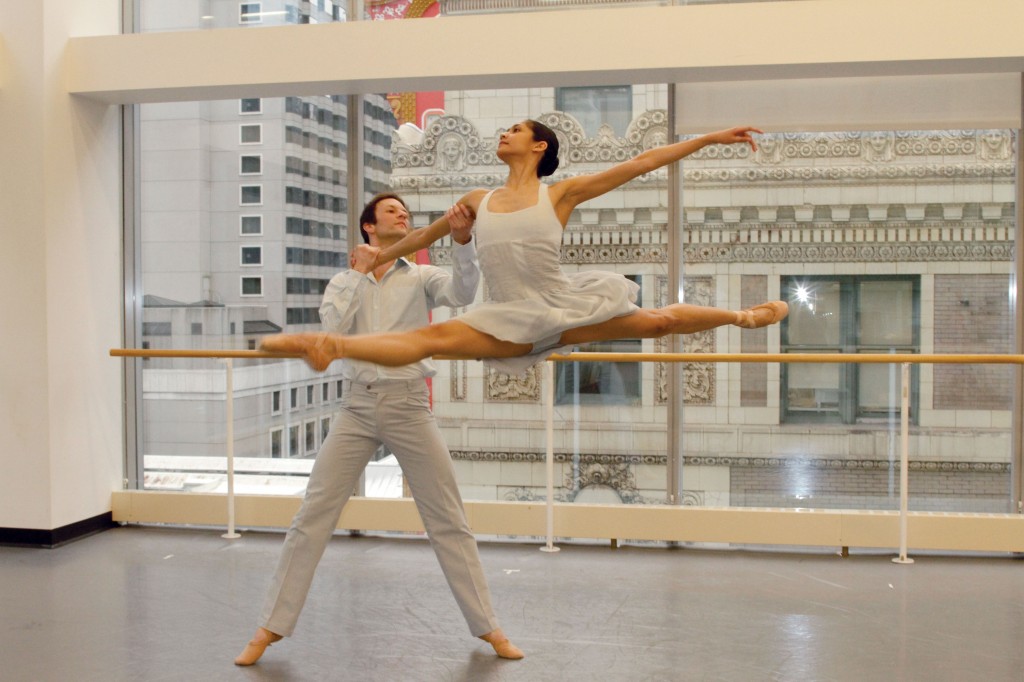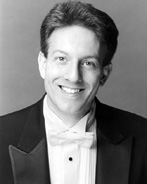
The Joffrey is taking on Romeo & Juliet this season, which has an amazing score by Sergei Prokofiev. We asked conductor Scott Speck some questions about the music, and he shares some wonderful insights with us here.
Can you share some background information about the composer and the development of this score?
One of the great thrills of working in the field of ballet is the opportunity to perform the score to Romeo and Juliet by Sergei Prokofiev. I am grateful to the Joffrey’s Artistic Director, Ashley Wheater, for programming it. All the musicians of the Chicago Philharmonic feel the same way.
Prokofiev was a Russian composer — or more accurately, for much of his life, a Soviet composer. But his work bears very little resemblance to that of his revered countrymen, Tchaikovsky or Stravinsky. Prokofiev had a musical style that was entirely his own. Generally speaking, he could be considered part of the Neoclassical movement — paying tribute to the great Baroque and classical masters with a familiar tonal language and forms such as the “Gavotte”, but with a modern take that could never be mistaken for anything but twentieth-century. But Igor Stravinsky was also a neoclassicist for part of his career, and there is no confusing the two composers. Prokofiev’s style is very melodic — there is hardly a moment that can’t be sung. He got his start in ballet early, moving to Paris and composing for a very young Balanchine and the Ballets Russes. (In fact, Prodigal Son, which the Joffrey Ballet performs in September, was one of his first in the genre.) If he did imitate the great Russian ballet composers in any way, it was in his pacing. The music drives the action in the play admirably, with gorgeous melodies for each major character and theme in the story.
What are some of the particular challenges when it comes to conducting the music of Prokofiev for this ballet?
The biggest challenge is the sheer virtuosity of the writing — the difficulty of the score itself. Being a great pianist, Prokofiev infused his scores with devilish technical challenges that would be much easier to play on the piano than on the various instruments of the orchestra. It takes a truly great orchestra to do justice to the intricacies of his music. Luckily we have the Chicago Philharmonic!
Are there any specific instruments that feature prominently here, and what does that add to the overall feel and mood of the score?
I remember listening to this music as a kid, and immediately being struck by Prokofiev’s inventive use of instruments. For example, at the reprise of the “Dance of the Knights” — the brash and aggressive music that accompanies the opening of the Capulets’ ball, Prokofiev introduces a saxophone. A saxophone! Not the first instrument you’d think of for a ballroom scene. But it works brilliantly. It immediately infuses this ponderous and serious music with a modernism, a sardonic mood, even a sultry wink. Elsewhere in the score (though not in the version we are performing), Prokofiev makes use of two mandolins, madly strumming. And in one of the love scenes, he introduces a now-forgotten instrument, the viola d’amore, which gives the dance a timeless quality and also harkens back to the ancient roots of this story.

What portion of the music do you personally most enjoy–and why?
In specific terms, I enjoy the Balcony Scene — and I think most musicians and dancers would tell you that this is their favorite section as well. The combination of mood, atmosphere, romantic feeling and sheer melodic invention is breathtaking. As for what I enjoy most about the entire score, it’s a toss-up between melody and orchestration, both of which are highly imaginative in an almost subversive way. I’ve already alluded to the sly use of such instruments as saxophone and viola d’amore. As for the melody, you could hum your way through the entire score…the melodic flow almost never stops. Coming up with enough memorable tunes to fill two hours is no mean feat — very few other composers could do it. I could tick them off on one hand: Mozart, Tchaikovsky, John Williams. And it’s not just that the melodies are hummable — they are GLORIOUS!
Is there anything you can highlight from the score that viewers/listeners may appreciate knowing about ahead of time?
Considering that the ballet came out in 1935, it’s surprisingly Romantic. There are very few composers who were writing such unabashedly sweeping tonal music at that time. Richard Strauss and Rachmaninoff are two of the greats who did. Almost everyone else was swept up in the wave of modernism, having been convinced that all the great ideas in tonality had already been used, and that there was nowhere else to go. Prokofiev disproved that notion spectacularly. But there’s a big difference between this music and that of Rachmaninoff — or Rachmaninoff’s own teacher and spiritual forbear, Tchaikovsky. Unlike the great works of those composers, while Prokofiev’s music has great sweep and passion, it has not a hint of sentimentality. There are many times when Prokofiev keeps us at a bit of a distance, describing an emotion representationally, rather than wallowing in it. In a story like Romeo and Juliet, this makes the listener supply his or her own human link to the sentimental aspects of the story. For a cynical, “seen-it-all” time period like the mid-twentieth century — or now — it works perfectly.
How did this ballet compare to others in terms of working with the Joffrey dancers? Was any special preparation needed?
In this work, unlike a ballet like Don Quixote or La Bayadere, there are very few moments where every note of the music has to correspond to a particular step. For the most part, the Chicago Philharmonic and I are able to perform this music as if it were a symphonic suite, allowing all of the ebb and flow to happen musically. The dance then takes on a very large-scale, sweeping, symphonic shape. More than most ballets, the ballets of Prokofiev can be enjoyed thoroughly on their aural merits.
And speaking of aural merits — Prokofiev’s Romeo and Juliet is the only ballet I’ve ever conducted where everyone from the musicians to the dancers to the ballet masters to the costume and set designers — and even the wig makers — regularly will come up to me to say, “My GOD, this music is amazing!” And it ranks on the Top Ten list of nearly every orchestral player I know. I am savoring this amazing score.
It doesn’t get any better than this.
The Joffrey performs Romeo & Juliet at Chicago’s Auditorium Theatre April 30th through May 11.

With recent performances in London, Paris, Moscow, Beijing, Chicago, San Francisco and Washington, Contributor Scott Speck has inspired international acclaim as a conductor of passion, intelligence and winning personality.
Scott Speck’s recent concerts with the Moscow RTV Symphony Orchestra in Tchaikovsky Hall garnered unanimous praise. His gala performances with Yo-Yo Ma, Itzhak Perlman, Joshua Bell, Midori, Evelyn Glennie and Olga Kern have highlighted his recent and current seasons as Music Director of the Mobile Symphony. This season he also collaborates intensively with Carnegie Hall for the seventh time as Music Director of the West Michigan Symphony. He was recently named Music Director of the Joffrey Ballet; and he was invited to the White House as Music Director of the Washington Ballet.
In recent seasons Scott Speck has conducted at London’s Royal Opera House at Covent Garden, the Paris Opera, Washington’s Kennedy Center, San Francisco’s War Memorial Opera House, and the Los Angeles Music Center. He has led numerous performances with the symphony orchestras of Baltimore, Houston, Chicago (Sinfonietta), Paris, Moscow, Shanghai, Beijing, Vancouver, Romania, Slovakia, Buffalo, Columbus (OH), Honolulu, Louisville, New Orleans, Oregon, Rochester, Florida, and Virginia, among many others.
Previously he held positions as Conductor of the San Francisco Ballet; Music Advisor and Conductor of the Honolulu Symphony; and Associate Conductor of the Los Angeles Opera. During a recent tour of Asia he was named Principal Guest Conductor of the China Film Philharmonic in Beijing.
In addition, Scott Speck is the co-author of two of the world’s best-selling books on classical music for a popular audience, Classical Music for Dummies and Opera for Dummies. These books have received stellar reviews in both the national and international press and have garnered enthusiastic endorsements from major American orchestras. They have been translated into twenty languages and are available around the world. His third book in the series, Ballet for Dummies, was released to great acclaim as well.
Scott Speck has been a regular commentator on National Public Radio, the BBC, the Australian Broadcasting Corporation, and Voice of Russia, broadcast throughout the world. His writing has been featured in numerous magazines and journals.
Born in Boston, Scott Speck graduated summa cum laude from Yale University. There he founded and directed the Berkeley Chamber Orchestra, which continues to perform to this day. He was a Fulbright Scholar in Berlin, where he founded Concerto Grosso Berlin, an orchestra dedicated to the performances of Baroque and Classical music in a historically informed style. He received his Master’s Degree with highest honors from the University of Southern California, served as a Conducting Fellow at the Aspen School of Music, and studied at the Tanglewood Music Center. He is fluent in English, German and French, has a diploma in Italian, speaks Spanish and has a reading knowledge of Russian.
Scott Speck can be reached at www.scottspeck.org




